Homeowners in Columbus and beyond frequently face challenges with securing outdoor garbage and compost areas from raccoons. These clever animals, with their nimble paws and impressive problem-solving skills, can quickly turn your backyard into their personal buffet if precautions aren’t taken. Implementing proper raccoon-proof outdoor garbage tips and strategies to secure compost can make a significant difference in preventing raccoons in outdoor trash areas, protecting your property, and maintaining your peace of mind.
Understanding how to secure these areas is essential for reducing the risk of rummaged garbage and destroyed compost, all while keeping your outdoor space clean and safe. Below, we’ll share practical solutions and effective measures to keep these mischievous wildlife at bay.
Why Securing Outdoor Trash Areas is Important
If you’ve found spilled trash on your lawn or compost that’s been foraged through, you know how frustrating and unsanitary these situations can be. Raccoons are persistent and intelligent creatures, easily navigating trash bins for leftover dinner scraps or compost for vegetable peels. Their ability to identify food sources poses not only an inconvenience but also potential health and property risks.
- Scattered trash can attract unwanted animals, leading to additional challenges.
- Raccoon droppings may carry harmful bacteria or parasites like Baylisascaris (roundworm), posing health risks to humans and pets.
- Neglected garbage areas can become breeding grounds for contamination and disease.
Beyond health concerns, these nocturnal animals are notorious for the damage they can cause. Attempting to enter trash bins, they can damage lids, break into compost bins, or even worsen pre-existing weaknesses in structures.
This is especially true for properties that don’t have secure garbage collection systems or proper deterrents in place. Taking the time to make outdoor trash areas raccoon-proof not only reduces these risks but also ensures a more hygienic and visually appealing outdoor area.
Preventing Raccoons in Outdoor Trash Areas
Preventing raccoons in outdoor trash areas starts with upgrading the way you manage waste. The first step is choosing the right garbage containers. Look for bins made of sturdy material, like heavy-duty plastic or metal, that are specifically designed to withstand animal interference.
Bins with locking mechanisms are especially effective in keeping persistent raccoons at bay. If your bins don’t have locks, you can also secure their lids using bungee cords or weights. While inconvenient at first, this simple step can make a world of difference.
You should also make a habit of placing your trash bins in well-lit areas. Raccoons are naturally nocturnal and prefer operating under the cover of darkness. By using motion-sensor lights around garbage areas, raccoons are likely to feel startled and avoid these zones. Additionally, storing garbage in a shed or garage until the morning of collection can minimize attraction.
Equally critical is keeping bins clean. Raccoons are drawn to the smell of leftover food that can easily linger in trash cans, even after trash bags have been removed. Wash your garbage containers regularly with soap and water to eliminate lingering odors. Using double-layered or scented garbage bags can add an extra layer of defense, making it harder for smells to escape and lure raccoons into the area.
Lastly, avoid leaving food scraps outside overnight or unnecessarily storing bags directly on the curb. By limiting easy access to trash and sticking with a strict collection routine, we reduce the chances of attracting unwanted visitors in the first place.
How to Secure Compost from Raccoons
Compost piles can be an irresistible buffet for raccoons, offering them easy access to fruit peels, vegetable scraps, and other organic materials. To prevent these clever animals from raiding your compost, it’s important to take proactive steps to secure your setup and maintain it properly.
- Invest in a raccoon-proof compost bin with a tight-fitting lid or locking mechanism to keep wildlife out. Compost tumblers are a great option, as their enclosed design protects from animals while promoting efficient decomposition. Avoid open compost piles altogether, as they are the easiest targets.
- Minimize raccoon-attracting items by avoiding meat, dairy, or oily food scraps, which produce strong odors. Stick to plant-based waste like vegetable peels, fruit cores, and bread scraps.
- Add brown materials such as leaves, straw, or cardboard to help reduce odors and balance decomposition. Aerate your compost regularly to prevent odor buildup that might attract raccoons.
- Place your bin on a flat, hard surface like concrete to stop raccoons from digging underneath. If concrete isn’t an option, use thick chicken wire or hardware cloth under the bin to block digging while maintaining proper drainage.
- Position your compost bin away from fence lines or low-hanging trees that raccoons can use to climb into it. Placing it closer to your house or within the range of a motion sensor light can also serve as an effective deterrent.
By following these steps, you can ensure your compost stays secure while still breaking down efficiently. With the right approach, you’ll keep raccoons out and maintain a successful, wildlife-safe composting system.
Raccoon-Proof Outdoor Garbage Tips for Columbus Homeowners
Living in Columbus comes with its own challenges when it comes to raccoon control. With plenty of food scraps from trash and compost, raccoons can easily become a problem for homeowners. Taking proactive steps can help keep them at bay.
Start by using the colder months to your advantage. During this time, raccoons are less active as they seek shelter. Inspect your trash areas for weak spots—like broken bins, loose lids, or strong odors—and fix them before scavenging season picks up.
Setting boundaries is key. Install fencing around garbage and compost areas, making sure it’s at least 3-4 feet tall and made from slick materials raccoons can’t climb. If fencing isn’t enough, try raccoon repellents around these areas to discourage them from getting too close.
Regularly check your property for gaps or holes near outdoor trash or garage doors and seal them quickly to stop raccoons from nesting nearby.
Finally, reach out to local waste management services for tips specific to Columbus. Many services offer sturdy, animal-resistant bins that can make a big difference.
With these simple steps, you can enjoy a raccoon-free home!
Take Control of Your Space Today
By securing outdoor garbage and compost areas effectively, homeowners can manage and mitigate raccoon activity while maintaining sanitary, safe, and organized outdoor spaces. Simple changes, like switching to locking garbage bins, investing in compost tumblers, and regularly cleaning trash areas, can dramatically improve your yard’s defenses against persistent animals.
At Skedaddle, we’ve helped countless households tackle this challenge with strategic solutions tailored for each space. If you’re ready to take control of your backyard, trust the professionals. Contact us today to put proactive defenses in place and ensure your home stays raccoon-free.




